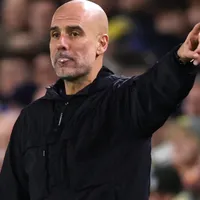ESPN’s critically-acclaimed film series 30 For 30 is set to release a series of eight films beginning in April, two of which will be feature-length films — one on the Hillsborough Disaster and the other about Argentina — plus 10 vignettes as part of the network’s World Cup 2014 coverage.
In 2010, ESPN released the brilliant The Two Escobars film. rated the number one soccer film of all time by World Soccer Talk.
“With ESPN being the home of the 2014 FIFA World Cup, we know that sports fans will be looking forward to high quality content focused on what is perhaps the world’s most revered sport,” said Connor Schell, VP of ESPN Films and Original Content. “We feel this is the perfect time to expand upon the success of our 30 for 30 series by focusing this collection on some of the incredible stories of soccer’s legendary past.”
Based on the track record of ESPN Films, there’s no doubt that much of the following programming will be must-see television. Plus the sheer quantity of coverage is quite impressive indeed.
Here’s more details about the eight films and 10 vignettes, as part of 30 For 30’s Soccer Stories:
Two feature-length films:
Hillsborough
Directed by Daniel Gordon
25 years ago, on April 15, 1989, the worst disaster in British football history occurred in an overcrowded stadium in Sheffield, England, 150 miles north of London. 3,000 fans flocked through the turnstiles to head to the area reserved for standing, despite a capacity of less than half of that. The result was a “human crush” that killed 96 people and injured 766. Prior to the disaster at Hillsborough, British football was known for the grime of its stadiums, hooligan fans and inadequate facilities, but great change came after the Hillsborough disaster. What emerged is now known as the most rich and powerful soccer league in the world, the English Premier League.
White, Blue and White
Directed by Camilo Antolini; Produced by Juan José Campanella
Although a large number of Argentinian players have found football success around the world, few have made a name for themselves in England’s top league. One notable exception is Ossie Ardiles. Fresh off Argentina’s victory in the 1978 World Cup, Ardiles and his compatriot, Ricky Villa, joined Tottenham Hotspur later that year, when the notion of overseas players was still new to the English league. Helping lead Spurs to victory in the 1981 FA Cup, the Argentinian stars became cult heroes in England. But on April 2, 1982, everything radically changed as Argentinian troops descended on the British-ruled Falkland Islands, asserting rightful sovereignty. A conflicted Ardiles returned to Buenos Aires two days later, his bright future with Spurs suddenly in question.
Six 30-minute films:
Garrincha: Crippled Angel
Directed by Marcos Horacio Azevedo
In Brazil, Pelé is “The King.” But his teammate, Mané Garrincha, is also remembered as the one of the best soccer players of all time. In a country where the sport grants its protagonists such royal deference, Garrincha is the jester– an entertainer who amused crowds and turned soccer into an irresistible spectacle, all while helping Brazil capture two World Cups. This, despite his legs being so bent that early in his career doctors deemed him unfit to play professionally. Match after match, he proved them wrong. But his unpredictable moves were of little assistance after his playing career came to an end. Abandoned by the soccer establishment, Garrincha died a victim of alcoholism in 1983. But his fans did not forget him. His body was brought to a cemetery, in the outskirts of Rio de Janeiro. Garrincha’s relatives had to borrow a grave, which turned out to be too small for his coffin. Thousands of people flooded the tiny burial ground, much more than the place could accommodate. After 49 years of a brilliant career and tumultuous life, the man who turned soccer into a “Beautiful Game” was memorably laid to rest. His legend lives on.
Barbosa – The Man Who Made All of Brazil Cry
Directed by Loch Phillipps; Executive Producers: Jonathan Hock & Roger Bennett
In 1949, Goalkeeper Moacir Barbosa and his Brazilian national team are on top of the world, having just won the South American championship by a score of 7-0. Barbosa is one of the heroes, widely considered one of the world’s best goalkeepers. But everything changed during the 1950 World Cup, played for the first time in Brazil. Before the final game against neighbor and rival Uruguay, the Brazilian Football Confederation was so confident of victory it had made 22 gold medals with the names of their players imprinted on them. With 11 minutes left, Uruguay shocked the estimated crowd of 200,000 at Marcana and scored the winning goal – a goal that is still considered to be the greatest sporting tragedy to befall Brazil. The blame was mostly pinned on Barbosa for being out of position on his goal line, tantamount to Bill Buckner letting a baseball roll between his legs. The country went into a deep mourning, fans committed suicide, and Barbosa was nationally blacklisted. Barbosa was considered cursed and he never played in another World Cup. He rotted away, practically penniless and alone. On July 13th, the 2014 World Cup Final will again take place at the Maracana, giving the Brazilian team the chance to write a new ending into Brazilian folklore.
Ceasefire Massacre
Directed by Alex Gibney and Trevor Bunim
New Jersey, June 18, 1994. Giants Stadium is awash with green as Irish soccer fans arrive to watch Ireland’s opening World Cup match against the mighty Italy. The sense of optimism is infectious. The Celtic Tiger is in its infancy, Bill Clinton’s decision to grant a visa to Irish Republican leader Gerry Adams has propelled the peace process forward and Jack Charlton’s team are walking onto the pitch before 75,000 fervent spectators made up of Irish, Italians and Americans of Irish and Italian decent. Amongst the fans is Irish Prime Minister Albert Reynolds who is sitting with members of an American group who’ve been working behind-the-scenes to end the conflict in Northern Ireland. The electrifying mood is shared by the supporters watching the match in the Heights Bar, a tiny pub in the Northern Irish village of Loughin Island, 24 miles south of Belfast. At the half, the Irish are remarkably ahead 1-0. Shortly after the second half begins, two masked gunmen belonging to a Protestant terror group burst into the Heights Bar. Thirty rounds are fired and six innocent men watching a soccer match were killed. Ceasefire Massacre will reveal how the juxtaposition of the jubilation felt inside Giants Stadium against the horrors of what happened in the Heights Bar, encapsulated the mood of the time. After 25-years of conflict, Ireland and her people longed for peace and prosperity but the brutalities of the violence in the North were never far from the surface. The gunning down of innocent men as they watched a soccer match marked both a low-point and a turning-point in the Northern Ireland conflict; one that would ultimately contribute to the paramilitaries on both sides calling ceasefires just weeks later.
The Opposition
Directed by Ezra Edelman
In the wake of the 1973 military coup in Chile, American-backed dictator Augusto Pinochet transformed Santiago’s National Stadium into a concentration camp where political opponents were tortured and assassinated. Only months later, that same stadium was scheduled to host a decisive World Cup qualifier between Chile and the Soviet Union. Despite protests, FIFA’s own investigation, and the Soviet’s eventual boycott, the Chilean team still played the game as planned, qualifying for the 1974 World Cup on a goal scored against no one.
Mysteries of The Jules Rimet Trophy
Directed by Brett Ratner
Inspired by Nike, the Greek goddess of victory, the Jules Rimet Trophy was awarded to the nation that won FIFA’s World Cup and was among the most coveted prizes in all of sports. It is also the sports prize shrouded in the most intrigue – with the whereabouts of the original trophy unknown to this day. This film focuses on the great prize’s first brush with crime – a Nazi plan to steal the Rimet Trophy from Italy during World War II. The story unfolds like a great caper film, where our hero, Ottorino Barassi, a mild-mannered Italian soccer official, attempts to protect a valued treasure.
Maradona ’86
Directed by Sam Blair; Executive Produced by John Battsek
In the 1986 World Cup, Maradona redefined what is possible for one man to accomplish on the soccer field. Already a figure of notoriety, but with one failed World Cup behind him, Maradona took possession of the international stage in Mexico, the spotlight rarely drifting from him as he wrote an indelible history with his feet and, of course, with a hand from God. Delivered with passion and intelligence, Maradona ‘86 is a fascinating, evocative and operatic portrait of Maradona, revealing his inner complexity and contradictions while basking in the joy and passion of his performance on the pitch as he wrote his name on soccer history forever.
10 Vignettes:
Coraçao
Directed by Jonathan Hock; Executive Produced by Roger Bennett
Brazil’s soccer tradition does not compete with other countries’ teams: it exists on a different level. But aside from soccer success, and despite Brazil’s recent economic boom, most Americans know little about the country, its geographical richness, gripping culture, and complex recent history in which the nation has transformed from a military dictatorship to a thriving, if young, republic. This short vignette series will travel from the beaches and favelas of Rio, to Salvador – the former hub of the slave trade – on a journey of music, dance, and history, to discover the stories that lie behind Brazil’s legend and explore how Brazilian soccer is truly the expression of the soul of its people.
Read more details about ESPN’s TV coverage plans for World Cup 2014 as well as the World Cup TV schedule and more World Cup news and coverage.













